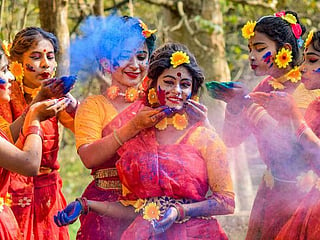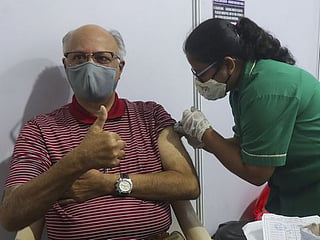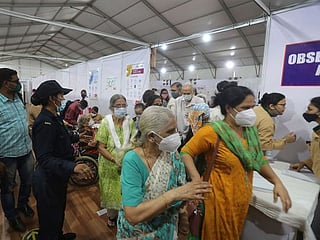India Elections 2021: Sexism is alive and kicking
From bermudas to fat hips, assembly elections and political patriarchy continues unabated

Also In This Package
There is an image that has been doing the rounds recently. The US Vice-President Kamala Harris walking the walk as she boards a plane. She owns it and she flaunts it, no questions asked, not an inch given.
Cue now to West Bengal where the country’s only woman Chief Minister has been given unsolicited male advice on her clothes — to ditch her sari for a pair of bermuda shorts.
In the election season the more Mamata Banerjee has pushed back against the full might of the BJP machinery, the quicker the barbs have kept coming and she has been ridiculed at every step, less and less for her politics and more because male politicians even today think it’s absolutely normal to mock a woman rival for what she is, a woman.
Umbrage over Didi’s sari
So, the West Bengal BJP chief Dilip Ghosh has taken umbrage that Didi’s sari isn’t covering her injured leg but the only thing this statement has exposed is Ghosh’s only misogynist mentality. If there has been one constant in 66- year- old Mamata’s life it has been her starchy white saris with a dash of forgettable colour pencilled into the border.
Such is the arrogance of gender that Ghosh refused to back down from his statement while ironically asking women voters who make up a large chunk of the Bengal votes to support his party. There is dystopia and then there is patriarchal politics.
West Bengal has almost 3.5 crore women voters, roughly half of the state’s total electorate of 7.32 crore and they can make or break this year’s extremely high stakes election. Yet the discourse has increasingly centred on Mamata as a woman rather than Mamata the politician.
From the Prime Minister mocking her to not fall from a scooty to former singer turned loudmouth Babul Supriyo who seldom has anything melodious to say calling her ‘paraya dhan’, the barrel has been scraped, by many.
Bengal though hasn’t had the monopoly on politicians openly displaying their political hierarchy during these assembly elections. Tamil Nadu has had its own Dilip Ghosh moment when DMK leader Dindigul Leoni announced that by drinking milk from foreign cows, women become like balloons and their hips like barrels.
Women voters are a necessity — they were almost at par with the men during the 2019 elections, but every now and then the mask of appeasement slips.
Sexism galore
This is not the only controversy the DMK was embroiled in. Lyricist Vairamuthu who is accused of sexually harassing more than one woman in the #MeToo movement shared the stage to support DMK chief MK Stalin’s candidature as the chief minister, the party seems to be ahead in the polls for both seats and crass act.
Its leader A Raja has apologised to a crying Chief Minister Palaniswami for saying that he was “born from an illegitimate affair as a premature baby.” A Raja says his intention was only to compare their political careers. And, we have never seen an election before!
Kerala has the best sex ratio in the country and although campaign rhetoric may be in control, the numbers are not. Women outnumber men in the electoral rolls yet, from a total of 240 candidates, less than 40 are women, that is roughly 16.6%.
Health minister Shailaja Teacher who has been the face of Kerala’s fight against Covid has urged for more women representation in the assembly elections and looking at the distorted discourse of socioeconomic power only more women in politics will show female voters when they are being played or that empowerment is not mere election tokenism.
Woman and Child Development Minister Smriti Irani seems an unlikely candidate for that, else she would have outright condemned Dilip Ghosh’s remarks. Like on Hathras, once again she chose politics rather than using her position to peel off a layer of thick sexism.
Irani who was more vocal when LPG was hiked by Rs7 than when petrol prices are 100/litre continues to give the impression that she runs the Ministry of Rahul Gandhi rather than any attempts to genuinely make women count.
Meanwhile, once there was Tripura Chief Minister Biplab Kumar Deb, who will someday hopefully make the headlines for getting some facts correct — has claimed that internet existed before the Mahabharata and couldn’t understand the beauty of former Miss World Diana Hayden, not that anyone was asking. Today he has many clones, each trying to outdo the last, like Tirath Singh Rawat.
Uttarakhand is not going to the polls, but its Chief Minister is on his own campaign, to showcase his class or rather the lack of it. When you eavesdrop, you may not always hear what you like. When you ogle, it’s worse, as he learnt.
On a flight, Rawat didn’t like the knees of a woman — a mother as he insisted on specifying — exposed through her distressed jeans. So, while covid cases increased and mutations entered India, Rawat was more preoccupied with how someone else’s clothes maketh man.
Today there are 78 women MPs in Lok Sabha (out of 716 women candidates who contested in 2019) and their percentage remains a miserable 14.3% — still behind Pakistan and Bangladesh.
Extension of misogynist culture
Inter Parliamentary Union lists global average of 25% for women in parliaments and in 2020, the World Economic Forum marked India at 122 out of 153 countries in their Global Gender Gap Report on women in parliament.
The voter bias against women candidates in the country is an extension of the misogynist culture that thrives in politics — women winnability is often questioned, if that fails, their dress is always the backup.
TMC MPs Mimi Chakraborty and Nusrat Jahan were trolled for coming to Parliament in western attire on their first day. They had won their seats and yet couldn’t win over regressive minds that force woman politicians in our country to often de-glamorise to own their success.
Harris and her heels are decades away, if ever. There are very few who stand up unapologetically because it is easier to merge than be taunted personally for standing out. Congress leader Priyanka Gandhi was once called a ‘skirt wali bai’ by a BJP leader during the 2019 elections.
I would love to believe that there is something filthy in the air only during the elections but unfortunately headlines say otherwise and those behind the traditional kurta pyjama often have more to hide, and that is definitely not seasonal.
What could be more telling than the fact the Women’s Reservation Bill which seeks to amend the constitution to reserve 1/3rd of all seats in Lok Sabha and all state legislatures for women is still pending after more than two decades with a status update of its complicated — for the men.
Sign up for the Daily Briefing
Get the latest news and updates straight to your inbox










